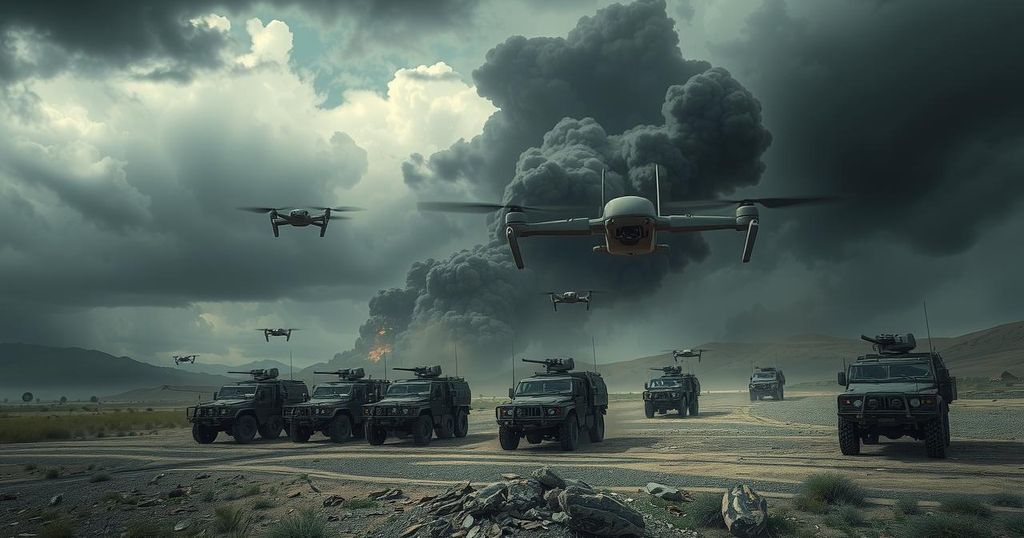World news
ASIA, BLACK SEA, CNN, DIPLOMACY, ENERGY INFRASTRUCTURE, EUROPE, EUROPE/ASIA, FRANCE, JOINT CHIEFS OF STAFF, KIM, KIM JONG UN, KOREA, NORTH, KOREA, SOUTH, KR, KREMLIN, MILITARY, MILITARY COOPERATION, MOSCOW, NORTH, NORTH AMERICA, NORTH KOREA, PARIS, PUTIN, PYONGYANG, RUSSIA, RUSSIA-NORTH KOREA COOPERATION, SAUDI ARABIA, SEOUL, SERGEI SHOIGU, SOUTH KOREA, TA, TASS, UKRAINE, UNITED STATES, US, VLADIMIR PUTIN, WAR, WHITE HOUSE
Marisol Gonzalez
0 Comments
North Korea Reinforces Russian Military with Additional Troops Amid Ukraine Conflict
North Korea has dispatched an additional 3,000 soldiers to Russia, boosting its military support amid the Ukraine conflict. This adds to the 11,000 troops already sent, with significant casualties reported. Moreover, North Korea is providing artillery and ballistic missiles to Russia as their defense partnership strengthens, raising concerns over potential technology sharing.
Recent reports from South Korea indicate that North Korea has dispatched an additional 3,000 soldiers to assist Russia in its ongoing conflict with Ukraine. This troop deployment occurs amidst global efforts to resolve the three-year war. Thus far, North Korea has contributed approximately 11,000 troops to the Russian military, with around 4,000 casualties reported as either killed or injured in combat operations.
In addition to personnel, North Korea has supplied a significant arsenal to the Russian military, including short-range ballistic missiles, self-propelled howitzers, and multiple rocket launchers. Analysts suggest that the support from North Korea is likely to expand further in response to the evolving combat situation. This revelation coincides with a meeting of European leaders in Paris aimed at enhancing support for Ukraine and fostering regional stability.
An agreement on a partial ceasefire was discussed during recent talks in Saudi Arabia, where both Russia and Ukraine committed to avoiding hostilities in the Black Sea. However, Russia has signaled that it will only adhere to the tentative terms if sanctions against its banking sector and exports are revoked, highlighting the disparity in expectations among the negotiating countries.
Leaders Kim Jong Un and Vladimir Putin have been reinforcing their security collaboration since the signing of a defense pact last year. During a recent visit to Pyongyang, Putin’s top security adviser conveyed the importance of maintaining commitments made between the two nations, indicating a continuous strengthening of military ties. Additionally, there are concerns that technological exchanges related to advanced satellite capabilities may emerge between Russia and North Korea.
Reports indicate that North Korean troops had been stationed in the Kursk region of Russia to assist in repelling Ukrainian advances since November. However, following substantial casualties, they were reportedly withdrawn in January. Casualty figures from South Korea suggest that approximately 400 North Korean soldiers have died and about 3,600 sustained injuries as of late February. Notably, North Korean soldiers have been documented employing extreme tactics, such as detonating grenades to avoid capture.
Throughout the conflict, North Korea has sent numerous shipments of munitions to Russia, while reports indicate that Moscow has utilized North Korean missiles against Ukraine. Furthermore, North Korean medical facilities have treated injured Russian soldiers, as shared by the Russian ambassador to Pyongyang. A reciprocal arrangement appears to be in place whereby Russia provides North Korea with essential supplies, including coal and food.
Amidst these exchanges, international observers remain wary of the growing partnership between North Korea and Russia, particularly with regards to potential technology transfers. Recently, Kim Jong Un supervised the testing of AI-powered attack drones, with indications of further developments aligned with modern warfare practices. South Korean military officials have suggested that certain North Korean reconnaissance drones may include technology sourced from Russia.
As the conflict continues, drone warfare has surged, with a considerable spike in Russian drone strikes targeting Ukraine. Attacks in recent days have led to injuries and damage to civilian structures, prompting urgent calls for an end to the violence. Ukrainian President Volodymyr Zelensky has expressed his dismay at ongoing assaults, stating, “No country should have to go through this.”
Amidst these turbulent circumstances, the geopolitical landscape remains volatile as North Korea and Russia deepen their military cooperation against a backdrop of international conflict.
In summary, North Korea’s recent reinforcement of troops and military supplies to Russia highlights its steadfast support for the country’s efforts in Ukraine. The collaboration extends beyond personnel to include arms and potential technological exchanges, raising concerns among global observers. As both nations continue to fortify their ties, the implications for regional stability and international relations intensify, particularly in the ongoing conflict involving Ukraine.
Original Source: www.cnn.com




Post Comment